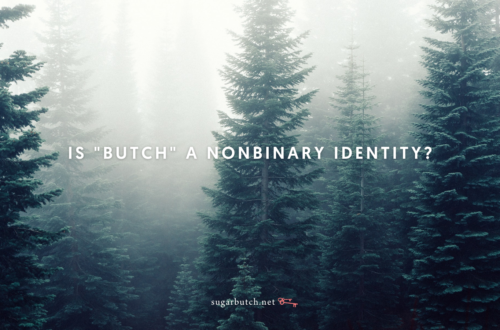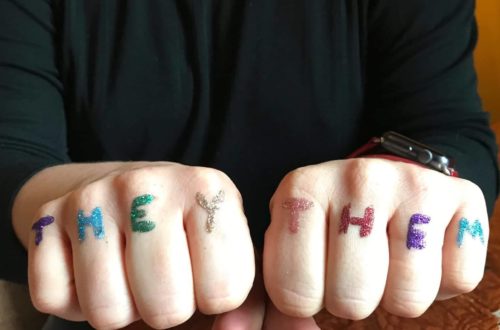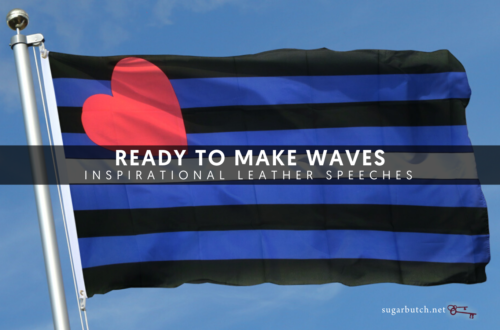I sit in shock at my desk, though I knew it was coming, knew Leslie Feinberg was sick, and know how deadly lyme disease can be is.
I sit feeling the shock of grief: Leslie Feinberg died this past weekend.
And today is the Trans Day of Remembrance, and that of itself gets me all weepy about all of those we’ve lost, all the hate, all the fear, and how far we have left to go. It makes me think about “butch flight” and the relationships between butch identity and transmasculine identity. It gets me thinking of my lineage, the legacy I am a part of, and where I came from.
For me, Leslie’s book Stone Butch Blues invented butch identity. If I had the word before the book, it was only as a slur, only as something nobody should want to be. If I had the word before Jess’s story and her tortured restraint of passionate love, it was only used to describe ugly women, unattractive and unwanted. It wasn’t until I read Stone Butch Blues that I realized it described me.
I’m not sure I wanted it to, but I knew that it did. That book made me feel exposed, like someone had found me out. Vulnerable, like someone could come along and pluck my heart from my unguarded chest to do with as they pleased. But also, strangely, it made me feel powerful. I could feel the power that came from being butch, the paradox of growing up a girl and then becoming the suited partner of a beautiful woman, the torture of being such a social outcast, and the deep craving hunger for being accepted.
—Felice Shays
But it is potent, and it seeped into me. It inescapably linked the words butch and stone, and for years I thought that being stone was the only way to be butch. It still feels like the butch/femme culture overly values stone in butches, that the stone—by which I mean, not receiving sexual touch—is one of the measures of the amount of gender dysphoria felt, and therefore the more stone a butch feels, the more butch they are. There is so much belittling in queer culture about masculine-presenting folks who want to be touched in bed, or—gasp!—are bottoms, and they are so often chided for not being a “real butch.”
I have been fighting fighting fighting this for years, both as a queer cultural community wound and internalized in my own body.
I have heard so many butches cite this book as their coming out root, as finally recognizing who they are by reading Jess’s story (Leslie’s story), and so many femmes cite this book as finally feeling like they could be queer and crave a masculine partner, or that it’s the “heartbreaking holy grail of butch perspective.” They have told me they see themselves in Theresa’s butch devotion. For so many of us, Feinberg’s book made our secret budding desires make sense.
I understand being nostalgic for a time that is now romanticized—not only in queer culture but in butch/femme lore and history. Beyond that, it is romanticized in the larger US culture as well, as it is the time post-WWII where this country was thriving, and idealized visions were planted in our collective (un)consciousness. But I also want to remember that while it might seem like butches come from that time, and thrived in that time, what we have now—and the myriad gender identity, expression, and presentation options available to us—is much improved.
I adore the butch/femme culture. As someone who highly identifies as a femme-oriented butch who is currently dating a trans boy, I adore it even more, and as I have a bit more distance now that I’m a little bit outside of it, I see copious places where the butch/femme culture reinforces the cultural binary gender roles, where it pigeonholes people into boxes of expectation, where people are shaved down to fit labels and not the other way around.
Stone Butch Blues may have invented butch identity for the current queer cultural movements, but we need a reinvention.
We need the new butch.
We need a butch identity where the masculine gender role is criticized and reinvented to include access to all aspects of emotionality, psychology, caretaking, feeling, hobbies, interests, and play.
We need a butch identity where we actively work toward undoing the racist culture that keeps people of color oppressed, their voices marginalized, and their bodies under attack. We need a butch identity which recognizes that butch has been historically a white identity, and that radical queer masculinity looks differently in other cultural contexts.
We need a butch identity where any kind of surgery and hormone taking and body modification is acceptable, supported, and celebrated without commentary on how we knew that butch was “trans all along” or that they are “betraying their womanhood” or teased, “another one bites the dust.”
We need a butch identity where the identity expands to fit who those claiming it, rather than those claiming it shrinking to fit inside of it.
We need a butch identity where it is okay to transition. We need a butch identity where it is okay to wear a dress. We need a butch identity where “butch” is just the starting point of the conversation, and where nobody assumes they know anything about you just because they know you are butch.
We need a butch identity that doesn’t assume topping and dominance as the norm, and that doesn’t put down butches who bottom, who receive touch, who submit beautifully and skillfully and with agency, who crave giving over, who crave being owned. We need a butch identity that doesn’t assume femme partnership as the norm, and that recognizes butches loving butches as a real and valid desire.
We need a butch identity that sees femmes as more than accessories, and that values femininity as solid, legitimate, and radical. We need a butch identity that doesn’t joke that femmes are having “a butch moment” if they fix something or play sports or act tough.
We need a butch identity that embraces the myriad mashup versions of in-between genders, of genderqueerness, male feminity, fagginess, swishiness, and fabulousness. We need a butch identity that rocks glitter and leggings without shame, that encourages purses and boas, and that never makes fun of someone’s “girly drink” or pink button down shirt.
We need new butch icons, we need new butch events. We need to show up at events where butch and femme genders are celebrated and made visible (there are many already out there! Go to them! Participate!). We need to stop prioritizing and privileging masculine versions of queerness. We need to read femme authors like Minnie Bruce Pratt (seriously, have you read S/he? It is one of my top 5 of all time, it’s stunning), we need to work on dismantling white privilege. We need to read trans women like Julia Serano and Janet Mock, we need to listen to Laverne Cox, we need to listen to Ceyenne Doroshow and watch things like the Red Umbrella Project documentary about sex workers, we need to keep refining our activism, we need to work on our own privilege, we need to stay alive.
We need new butch clothes, despite Saint Harridan and Tomboy Tailors and all the other dozen (more?) creators of clothes for dapper queers that have popped up in the last few years, not because we don’t look good in those (damn, we do) but because most of those are suit-and-tie shops, and there are so many more ways to be butch than with a suit-and-tie. Let’s reinvent dapper fashion, let’s never be limited by the narrow masculine options that have existed so far, let’s go farther, let’s have it all.
Even as attached as I am to the word “butch,” we probably need new words. Language evolves as we do. We may even end up turning butch over for some new way to talk about the in-between space we occupy, that tortured passionate place of wanting, that marginalized place of vision and truth.
Perhaps we are moving toward something new, and even better.





Fuck Yes.
I was expecting this to be another touching memorial piece, which it is, but it isn’t only that.
I’m so proud of you for not accepting the world as it is, of looking deeper to see where it stingd and where we might find a better one that can be. That is the true, fitting memorial to a revolutionary, to pick up their flag and continue the fucking work.
why isn’t this getting more comment-love? in any case, i loved it. and not just because i was wearing a pink button-down shirt yesterday :) …largely for the calls to action, the statement of needs. much to contemplate there. thanks for writing.
Yes, oh yes. To Leslie and to reimagining what butch could be. Many of the things you say I feel need to be applied to masculine identities overall, even straight male ones. As queers we occupy a space of perspective that the dominant culture lacks: we’re forced to examine elements of our lives, identities, and society that they can blithely ignore. Let’s use that perspective, even if it was forced on us, to better the world.
Wow. This is so, so thoughtful and well written. The best reflection I’ve read about this particular moment by far. You say all of the things that I was thinking about Leslie Feinberg’s passing and then go beyond that to say all of the things that I hadn’t thought of, but should be thinking about. Finding Stone Butch Blues and nostalgia for butch identity and history was so meaningful and radical for me that it has led at times to this fear of critiquing the privileged masculine and white baggage that comes with it. I’ve also definitely been struggling lately with reconciling my butch identity with my own desire/passion/sexuality because of the stereotypes about butches being stone tops, but I don’t think I realized that some of my shame came from that place until now. You’re totally on point that butch has evolved to mean something much more complicated and intersectional than it did in 1993. Yes to everything. Thank you.
Just, thank you. By ’93 I was on the fast train to Hetland, but grew up in a queer culture that did not offer a vision celebrating butches or lesbians for their own special gorgeousness. You point the way to a place where all 31 flavours are not tolerated but accepted and celebrated. Best of all, you want us all to connect with the pleasure and beauty our bodies bring us, for which self-acceptance is key–acceptance you make happen with Sugarbutch.
Thank you for this one. Now is the time I feel I have to tell you: You are so awesome. I for myself absolutely do need the new butch. I’ve written my final thesis on femmes in queer subcultures and quite some of the points that were so important to me in this one I now find in your article. That’s pretty cool =)
Love,
a Femme from far, far away
Thank you for this. I’m almost done with my first dreading of Stone Butch Blues, and I found many of the issues you state here troubling too.
I agree we need a new language, we need media representation, clothing, acceptance, and to show our own ever expanding diversity.
Long Live The Butch!
Reading about the new butch is something I really needed to hear so much right now. This part especially struck a cord with me:
“We need a butch identity where any kind of surgery and hormone taking and body modification is acceptable, supported, and celebrated without commentary on how we knew that butch was ‘trans all along’ or that they are ‘betraying their womanhood’ or teased, ‘another one bites the dust.'”
I recently finished reading Stone Butch Blues and have come to terms with my identity. I want hormones and surgery because I have dysphoria, but I just can’t bring myself to let go of the butch identity. I’ve had trans men accuse people like me of being “transtrenders who are stealing resources” for not transitioning all the way and I’ve had other butch women tell me I’m “betraying my womanhood” and “mutilating my body.” For the longest time I’ve felt so torn up about choosing a side, feeling like in order to gain one thing in life I’d have to toss away another part of me. I’m only now accepting that it’s okay to have a genderfluid/non binary presentation, and it makes me feel so much more at peace seeing other butches who go by gender neutral pronouns, change their name, or take hormones.
One thing that really helped me overcome the “mutilation” comments is reminding myself of all the times conservatives said the same thing about my tats and piercings. It really helps put things into perspective.
Oh, and another thing to add, I’m a submissive who loves femme dommes. ;)
Thank you for this article. I have found myself at a loss for two years, as a Butch who suddenly found herself in a relationship with a cis man. I know I love him, but I also know what I am, and I feel like I’m betraying my Butch identity. I tried dressing and acting more feminine, which was uncomfortable for everyone involved.
For awhile I assumed I must be trans, because I just wasn’t finding other women like me. But I don’t really have dysphoria, more just frustration with that one button on a mensm button up shirt.
I’m happy where I am and how I express my gender as a masculine woman, and it feels good to know there are others who want to see the reinvention of Butch.